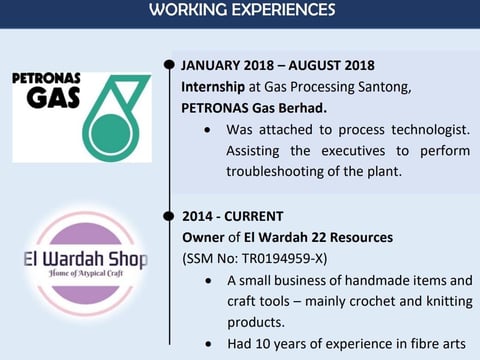When I was nearly graduating, like other graduates-to-be, I prepared my first resume to be handed over to recruiters. I attended my first job interview with company that provides me scholarship to attain degree in chemical engineering, PETRONAS.
Being a PETRONAS scholar back then was not a guarantee on job security in PETRONAS. Students are required to attend compulsory interview and seek for placement.
I was all out writing it and I followed what was advised; limit to 2 pages, keep it clean and professional, have a professional photo, list all campus achievements and involvements,
....and do not include unnecessary information such as your pet, your family details, your favorite color, and your hobby.
Putting away my precious hobby from resume is like putting away a piece of my life. It is a part of my character and I literally growing up with fibre arts. My resume didn't give the character that I want.
Should I put hobbies on a resume
My hobby, crochet, is some serious hobby. I made some money from crochet business. I registered my crochet business with SSM. I taught my friends and children how to crochet. My works were acknowledged and adored by the adults across age.
I asked opinions from my seniors. He said, I can put my little crochet business as one of my working experiences. Since I was a chemical engineering graduate seeking position in engineering, he advised to not highlight so much about it as it looks irrelevant with position that I seek for. I was encouraged to describe it briefly in working experiences.
This is the way I put it;


Incorporating hobbies into resume can be a powerful way to showcase personality and additional skills to potential employers. When selecting which hobbies to include, consider those that demonstrate valuable soft skills, such as teamwork, leadership, or creativity. For instance, if you enjoy team sports, it reflects your ability to collaborate and work well with others. Similarly, artistic hobbies can indicate creativity and attention to detail. Make sure to integrate these hobbies into a dedicated section on your resume or weave them into your work experience descriptions, highlighting how they contribute to your professional qualifications. Additionally, tailor your hobbies to align with the company culture or job role you’re applying for, as this can help you stand out as a well-rounded candidate. Ultimately, mentioning relevant hobbies can provide a fuller picture of who you are beyond just your work experience, making your application more memorable.
Recruiters' reaction to my resume
During my first interview session, the first thing they spot in my resume is my small business. They immediately reached to their phone, trying to view my Facebook pages to check out my work - but unfortunately, the internet line was unavailable in the room.
Before all the formal interview questions was asked, they immediately enquiry about my hobby. The nervous to attend the interview went away immediately. My mood lightened up talking about crochet. Only then, they proceed with the interview questions and enquire my final year project.
Imagine this. The recruiters and hiring managers have seen so much resume from fresh graduates, mentioning same topics that students experienced in campus. From esteemed university that offers technical and engineering course, they anticipate below list in the resume:
Academic achievements
Clubs involvements
Volunteers activity
Engineering projects
Internship
Sports
Out of the blue, my resume came in and metaphorically screaming, 'I have a small business crochet!'. This differentiates my resume from other candidates. The hiring managers immediately have ideas about who I was, making it easier to know each other during the job interview.
When I was waiting for placement, most of the positions that come to me were business & commercial position. Engineering position didn't come to me.
Long story short, I was recruited as commercial executive in Pengerang, Johor. My immediate superior recruited me based on my resume that mentioning my hobby business, viewing it as a potential to perform commercial job in chemical business.
Aligning your hobbies with the job description
Make your hobbies relevant to position that you apply. You may consider customizing your resume according to position that you apply for. For instance, indicating small business crochet while having chemical engineering background on my resume attracted petrochemical business to recruit me. They were eyeing for candidates that have business acumen while having technical knowledge in chemistry. However, my resume was not helping me to secure technical position.
Additionally, consider including hobbies that demonstrate skills applicable to the job, such as coding for tech positions or public speaking for roles requiring communication prowess.
Provide notable achievements from your hobby
Having a hobby singing in the shower does not make any sense to put on the resume. By making your singing hobby serious might help to put on resume. Maybe you win singing competitions. Maybe you have significant numbers of followers in Youtube channel. Maybe you secured sponsorship from small businesses to sponsor dresses and dancers for your live performance. Maybe you write songs for well-known artists.
Above examples display strong characters of passion, grit, lifelong learning and ability to influence people with your hobby.
Write your hobby in professional way
Ask AI how to write your hobby in professional tone and how it helps the job that you're applying. My small crochet business was not profitable, and I was struggling a lot with it. However, I included my hobby as one of my working experiences. I touched it up with professional tone.
Do not write too much about your hobby in resume
Do not write you hobby for half a page! Remember that hobbies on resume are just to give characters in resume and differentiates the resume from other candidates. Ensure that the hobbies included are genuine and that you’re prepared to discuss them in an interview, as authenticity can make a significant difference in how you are perceived.
How to include hobbies on resume



